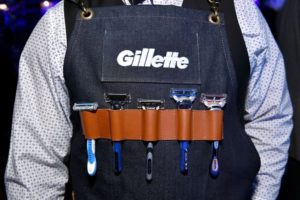
Ron DeSantis (Photo by Joe Raedle/Getty Images)
Florida Republican Gov. Ron DeSantis has made a lot of hay out of Disney’s multiple fumbles on its “woke” business practices. The company is making itself an easy pinata to hit. In the latest revelation, Disney’s LGBTQ-embracing “Pride” clothing collection is made in China, a nation that in the past year has declared homosexuality a mental disorder and announced a society-wide campaign against “sissy men.”
“It’s hypocritical, but it’s not surprising, that a woke company like Disney would threaten the rights of parents in Florida but would happily do business with the Chinese Communist Party – one of the world’s worst human rights abusers,” a DeSantis campaign spokesperson told Breitbart News in response to that site’s May 24 article on the subject.
 It is indeed unsurprising. But it is not hypocritical. “Highly effective corporate strategy” might be a better term for a practice that has been going on in full fervor for more than two decades. Only, it doesn’t seem to be working very well anymore.
It is indeed unsurprising. But it is not hypocritical. “Highly effective corporate strategy” might be a better term for a practice that has been going on in full fervor for more than two decades. Only, it doesn’t seem to be working very well anymore.
M&Ms: China as ‘Second Home’
Like most US-based major multinational corporations today, Disney is locked at the hip to China. The company would greatly prefer that its American consumers not focus on that. Enter fashionable politically-charged social preening. Disney’s wokeness is a deliberate domestic attempt to construct a fig leaf to conceal an aggressively enthusiastic canoodling with the tyrannical Asian regime so strong that the company can’t even refrain from ordering communist-manufactured rainbow mouse ears.
Let’s look at a couple of other egregious examples.
Woke M&Ms hit the 24-hour news cycle in January with word that the candy’s signature mascots would be more “gender-neutral.” The controversy came just as parent company Mars, Inc. was gearing up to serve as a sponsor for the 2022 Winter Olympics in Beijing in February. Curious timing.
How devoted is Mars, Inc. to its Chinese business partners? In a 2015 interview with state-run news outlet China Daily, CEO Grant Reid went over the top and then some.
“[W]e have deep roots in China,” Reid gushed. “We are not looking at an investment for one or two years. Instead, we see it as something for 50 or even 100 years. We consider China more like our second home.”
Gillette: China Is ‘The Future’

(Photo by Dia Dipasupil/Getty Images for Gillette)
Then there is Gillette, the razor blade company that spawned a storm of outrage in 2019 with its bizarre campaign against “toxic masculinity.” Men acting masculine might offend Gillette, but China suppressing and enslaving its Uighur minority does not.
Procter & Gamble, parent company of Gillette, was another prominent sponsor of the Beijing Olympics. P&G Chief Brand Officer Marc Pritchard was the very public face of the corporation’s toxic masculinity campaign, which proved a financial disaster. Pritchard was tireless in his hand-wringing over the pressing nature of the crisis.
It seems his moral thermometer does not get as overheated when discussing China, however. In 2021, advertising industry news site The Drum quoted Pritchard’s remarks to Raja Rajamannar, Mastercard chief marketing officer and president of The World Federation of Advertisers:
“‘If you want to see the future look to China,’ is Pritchard’s advice to his marketing peers. ‘China is where there is transformation happening. The market flipped a few years ago from the old brand building model to a digital ecosystem, from bricks and mortar to e-commerce.’
China is P&G’s second largest market globally and since 2014 it’s been the FMCG firm’s largest e-commerce market. Last year, the business announced plans to invest $100m over the next three years in its China Digital Innovation Centre in Guangzhou Development District….
‘The break throughs happening in this region are extraordinary,’ Pritchard adds.”
See how it works?
Rainbow mouse ears made in China and anti-masculine men’s razors are not a mistake but a very deliberate attempt at deflection. Disney, Mars, and P&G are wholly committed to their lucrative Chinese business ventures. Mickey Mouse clothing and countless other product offerings are going to be manufactured there.

(Photo by David McNew/Getty Images)
The expectation – which has been an overwhelmingly successful one for some 20-odd years – is that happy, shiny PC product rollouts will give a cheap moral sheen to a manifestly amoral, bottom line-oriented corporation.
The Wokeness China Syndrome attempts to put a human face on icy steel. That served a purpose in 2002. It does nothing but provide more ammunition to critics in 2022.
It will be interesting to see how these U.S. multinationals react to the obsolescence of their trusty old ploy. They will not be separating themselves from the bosom of their profitable Asian communist cronies anytime soon. And they are as out of touch with regular Americans as the most wooden of Swamp politicians in Washington.
If anything, a ratcheting up of the wokeness should be expected as the heat in the kitchen grows. Only now, it will serve a slightly different purpose. Instead of providing a curtain to distract customers, the woke drivel will serve as a security blanket for profit-hungry executives who do not want to face up to the moral bankruptcy of their China dealings.
Remember to check out the web’s best conservative news aggregator
Whatfinger.com — the #1 Alternative to the Drudge

